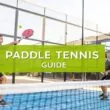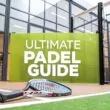Padel is exploding in popularity, and as more players pick up a racket, the gap between just hitting the ball and playing with real skill becomes incredibly obvious. Think of formal padel coaching as your ultimate advantage—it turns a fun hobby into a refined skill by building a strong foundation and seriously speeding up your learning curve.
Why Padel Coaching Is Your Secret Weapon for Improvement
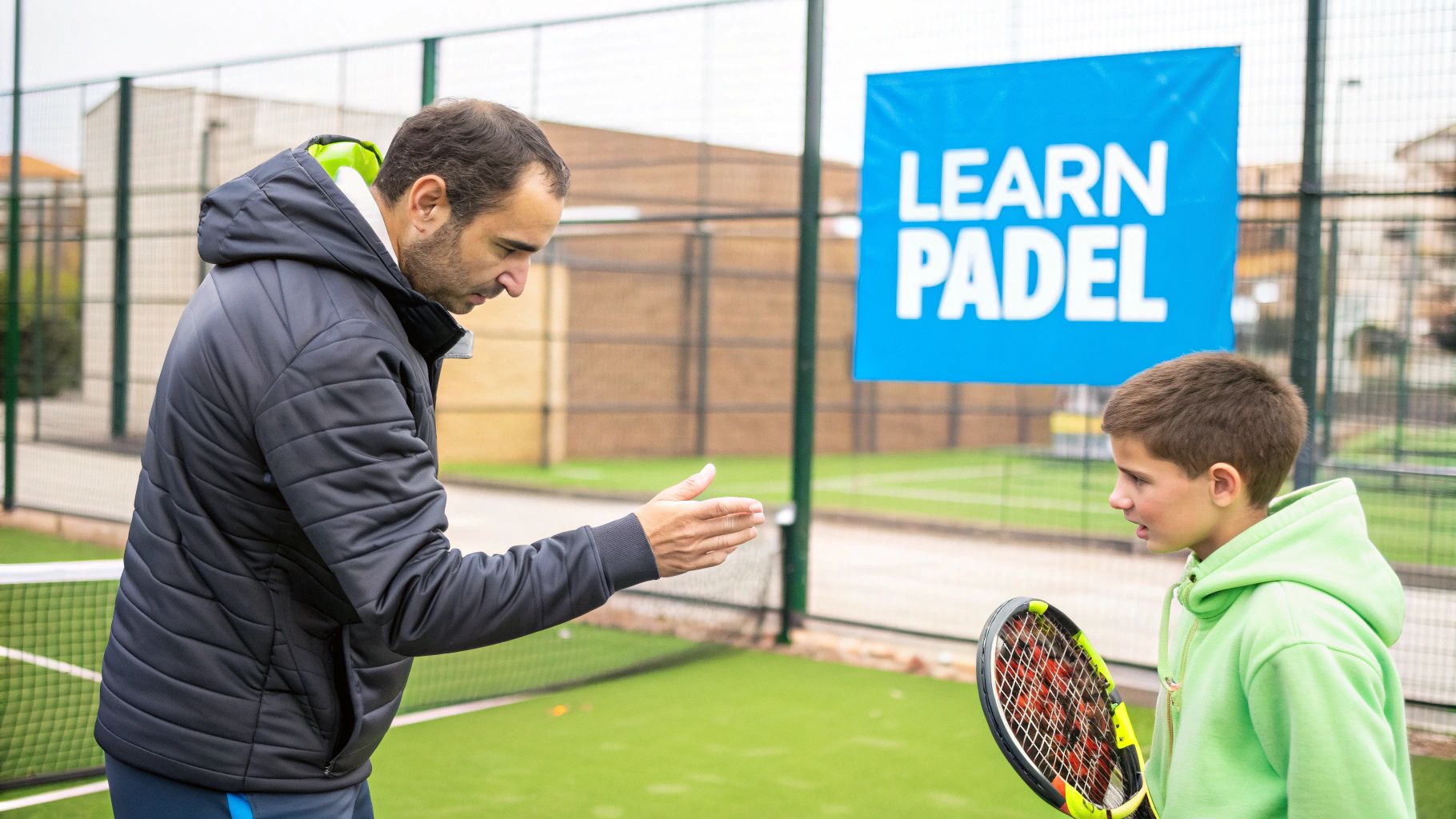
Here’s an analogy: learning padel is a lot like picking up a guitar. You can teach yourself a few chords and strum along to your favorite songs, but to truly create beautiful music, you really need a teacher. A coach provides the structure, technique, and theory that you’ll almost always miss when teaching yourself. This guidance is what separates players who hit a wall and plateau from those who just keep getting better.
The demand for this kind of expert guidance is absolutely surging. With over 40,000 padel courts now scattered across the globe and a projected growth rate of 26% through 2025, the need for qualified instructors has never been higher. This boom shows just how many players are realizing the immense value of professional coaching.

Buy the best padel gear to level up your next game!
CHECK OUT this deal from Padel Market!Get ready to take your game to the next level with the latest padel gear from Padel Market! Fast EU and Worldwide Shipping
Building a Solid Foundation
The single biggest advantage of padel coaching is getting your technique right from the very start. A coach's trained eye can spot and fix tiny flaws in your grip, footwork, or swing that you'd likely never notice on your own.
Fixing these issues early on is critical. Why? Because bad habits are incredibly tough to unlearn later. They can cap your long-term potential and, even worse, lead to injuries. A coach makes sure your fundamentals—from your ready position to your follow-through—are solid as a rock.
A coach doesn't just show you how to hit the ball; they teach you why you hit it a certain way. This deeper understanding of biomechanics and court positioning is the true bedrock of advanced play.
Accelerating Your Learning Curve
Without a coach, improvement often feels like a slow, frustrating process of trial and error. You might spend months trying to figure out why your bandeja keeps finding the net or why your defensive lobs always seem to fall short. Professional padel coaching simply removes the guesswork.
A good coach gives you a structured path to success, complete with targeted drills and instant feedback. This focused approach means you can master new shots and strategies in a fraction of the time it would take to figure it out alone. It’s all about playing smarter, not just harder.
- Targeted Drills: Instead of just playing endless matches, you’ll work on specific scenarios, like defending from the back glass or executing the perfect net-clearing volley.
- Strategic Insights: You'll learn where to stand, how to communicate with your partner, and how to pick apart your opponents' weaknesses.
- Mental Fortitude: A great coach also helps build your on-court confidence and resilience. You can learn more about developing a winning mindset by reading our article on sports psychology techniques.
Ultimately, coaching isn't just another expense; it’s a powerful investment in your skill, enjoyment, and longevity in the sport. It fast-tracks your journey from a casual player to a confident, strategic competitor.
The Four Pillars of Effective Padel Coaching
Good padel coaching isn't just about hitting a thousand forehands. It's a complete system built on four distinct but deeply connected pillars. When you start to see your game through this lens, you realize that true improvement comes from building a game where technique, tactics, fitness, and mental grit all work together in harmony.
A great coach won't just stand there feeding you balls. They’ll build a program that shores up each of these critical areas. This holistic approach is what stops you from developing glaring weaknesses that smart opponents will tear apart, turning you into a much tougher, well-rounded player.
Pillar 1: Technical Mastery
This is the bedrock of your game—the "how" behind every shot you hit. Technical coaching zeroes in on the nitty-gritty mechanics, from the way you hold the racket to your body rotation and follow-through. It’s all about creating efficient, repeatable movements that you can rely on, especially when the pressure is on.
Think of your technique as the engine in a high-performance car. You can have the slickest paint job and spoilers, but without a finely-tuned engine, you're going nowhere fast. Your coach is your master mechanic, dialing in every component:
- Shot Refinement: You have to master the shots that are unique to padel. The bandeja (a defensive overhead) and the vibora (a biting, slice-heavy overhead) are non-negotiable. A coach will break these complex movements down into simple, manageable steps you can actually learn.
- Grip and Stance: Tiny adjustments to your grip can be the difference between a shot finding the back wall or finding the fence. The right stance keeps you balanced and ready to pounce on whatever comes your way.
- Wall Work: Learning to love the glass walls is what separates padel players from tennis players. Coaching drills teach you how to read the bounces and transform what looks like a defensive scramble into a golden offensive opportunity.
Pillar 2: Tactical Intelligence
If technique is how you hit the ball, tactics are all about why and where you hit it. This pillar is about building your "Padel IQ." It’s about understanding where to stand, what shot to play, and, most importantly, how to work like a single unit with your partner. Padel is a game of high-speed chess, and a good coach teaches you to think two or three moves ahead.
It's a classic mistake: players with beautiful strokes but absolutely no game plan. They can hit any shot in the book but have no idea which shot to hit in the moment. Tactical coaching is the bridge that turns a great ball-striker into a genuinely smart player.
Coaches build your tactical mind by running you through game-like scenarios and teaching you to spot patterns. This is where you learn when to rush the net, when to hang back and lob, and how to construct a point piece by piece to force an error or create an easy winner.
This infographic shows how these pillars build on each other, starting from foundational skills and moving up to strategic thinking and physical readiness.
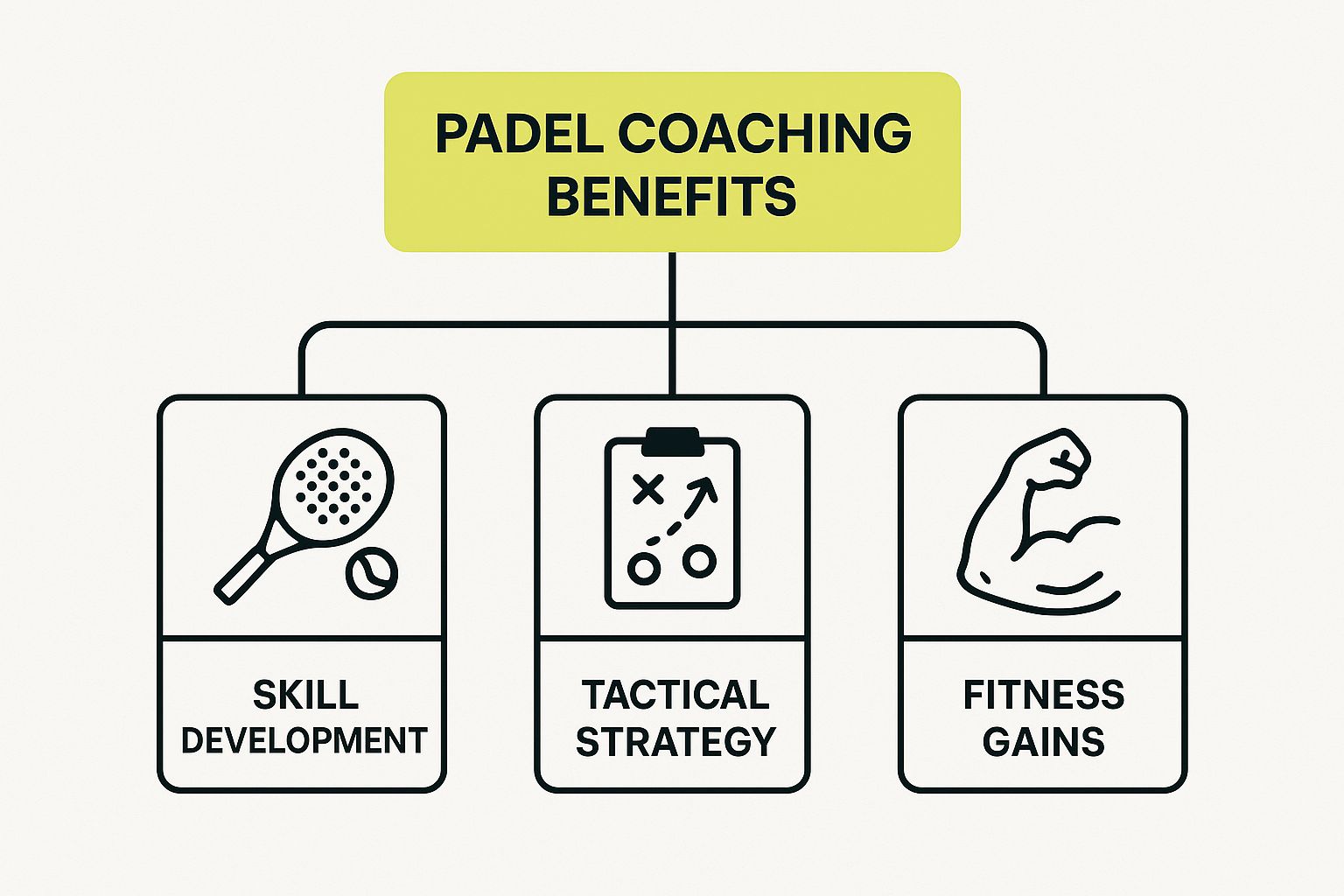
As you can see, solid skills are the base. But it’s the tactical layer that tells those skills what to do, while fitness gives you the gas in the tank to execute the plan from the first point to the last.
Pillar 3: Physical Conditioning
Padel isn't tennis. It demands its own unique blend of agility, explosive bursts of power, and surprising endurance. The court is small, which often leads to long, grinding rallies that require constant, rapid changes of direction. Conditioning for padel isn't about running a marathon; it's about being fit for the specific demands of the sport.
A coach will have you doing drills that mimic the exact, frantic movements you make in a real match. This kind of targeted training builds functional strength and is your best defense against common injuries. The main focus areas are:

Buy the best padel gear to level up your next game!
CHECK OUT this deal from Padel Market!Get ready to take your game to the next level with the latest padel gear from Padel Market! Fast EU and Worldwide Shipping
- Footwork: Quick, choppy, efficient steps are everything for court positioning.
- Agility: Drills that force you to move side-to-side and turn on a dime.
- Core Strength: A powerful core is the secret engine behind rotational shots like the vibora and bandeja.
Pillar 4: Mental Toughness
This final pillar is what separates the good players from the great ones, especially when the match gets tight. Mental toughness is your ability to stay locked in, handle the pressure of a big point, and bounce back immediately after a mistake. Your coach often doubles as a sports psychologist, helping you forge the mindset of a winner.
It’s about building pre-serve routines, learning to reset your emotions between points, and playing with unshakeable confidence, even when the scoreboard isn't in your favor. By strengthening all four of these pillars, your padel coaching becomes more than just lessons—it becomes a complete blueprint for your improvement.
Unlocking Your Potential with Professional Coaching
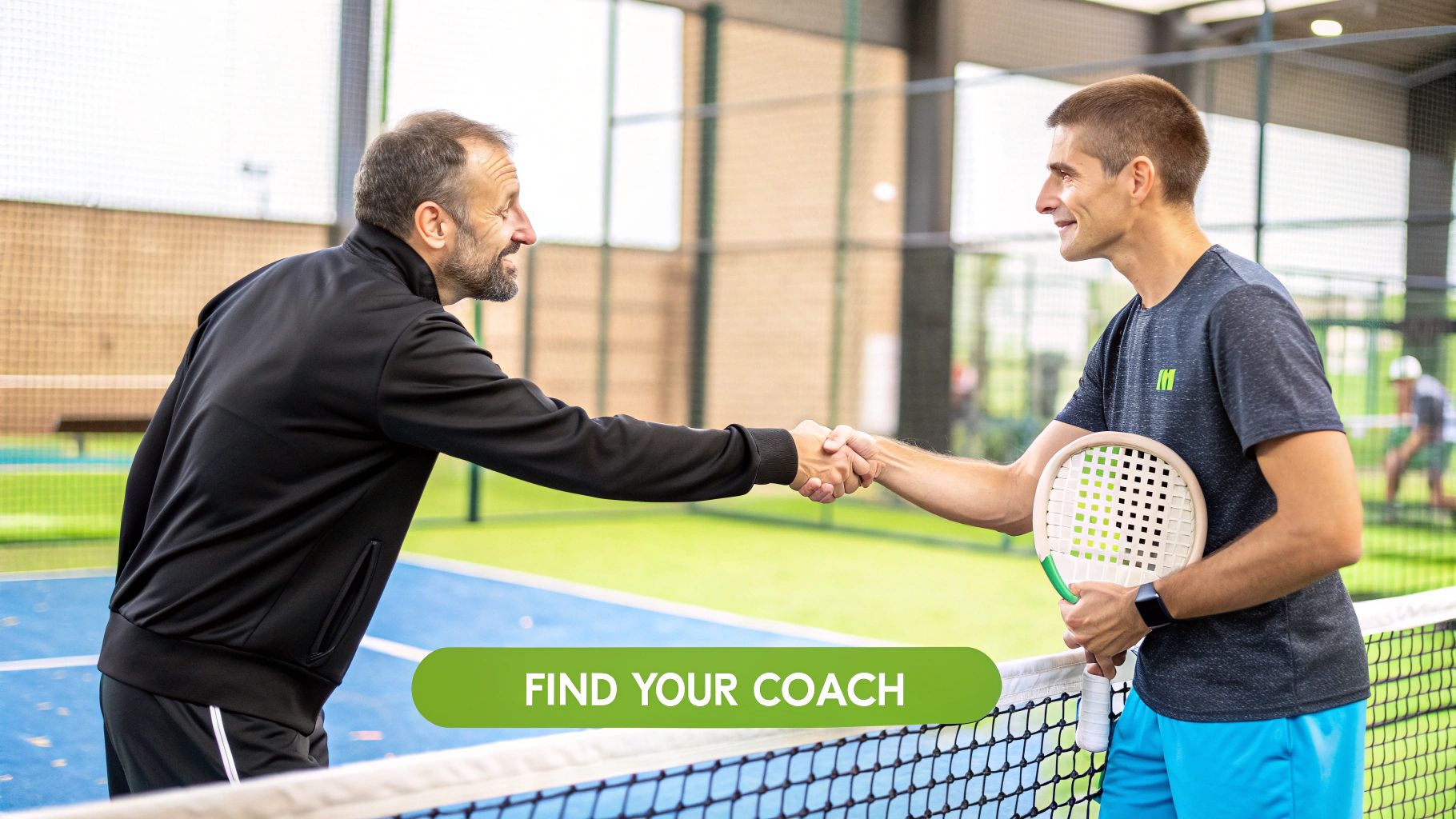
So, you're thinking about getting a coach? Let me tell you, it's one of the best investments you can make in your game. Hiring a professional padel coach delivers real, tangible results that go way beyond just hitting a cleaner forehand. It's about skill, strategy, and even keeping your body healthy for the long haul.
Think of a good coach as an accelerator for your game. They have a trained eye that spots the little things you can't see—that tiny wrist flick on a volley or the wrong footwork on a bandeja. These are the subtle habits that can secretly hold you back for years. A coach catches them instantly and gives you the exact drills and feedback to build a more solid, reliable game from the ground up.
Accelerated Skill Development and Technique
One of the biggest wins from coaching is how fast you build a strong technical foundation. Left to our own devices, we all tend to develop "homemade" shots that feel okay but crumble under pressure. Coaching throws out the guesswork and replaces it with proven mechanics.
Take a complex shot like the vibora. A coach can break it down into simple, repeatable steps. They’ll fix your swing path, get your body rotating properly, and help you generate that nasty slice that makes the shot so deadly. This structured approach means you spend less time getting frustrated and more time seeing actual progress on the court.
A coach’s job isn't just to make you hit the ball well today; it's to give you the tools and understanding to self-correct for the rest of your playing career. They are building a smarter, more adaptable player.
This focused training helps you nail down new skills in weeks, not years. That constant feedback loop—hit a shot, get immediate advice, and try again—is the quickest way to bake in good muscle memory.
Building Your Padel IQ and Strategic Mind
Beyond just hitting the ball, padel coaching is absolutely crucial for developing your "Padel IQ." This is your knack for reading the game, knowing what your opponents are about to do, and making smart decisions in the heat of a rally.
A coach teaches you to see the court as a chessboard, not just a box to hit balls in. Suddenly, positioning and shot selection become everything.
You'll start to master essential strategic concepts:
- Court Positioning: Learning where to stand after every shot to cover the highest-percentage reply.
- Shot Selection: Knowing when to play a soft lob to reset a point versus driving the ball hard at someone's feet.
- Partner Communication: Developing that unspoken understanding with your partner so you move like a single, coordinated unit.
This is the stuff that transforms you from a player who just reacts to a player who controls the flow of the game.
Injury Prevention and Physical Longevity
Here’s a benefit that’s critical but often overlooked: injury prevention. Padel is full of quick, explosive movements, sharp turns, and lots of overhead shots. Doing all that with bad form is a fast track to common problems like tennis elbow, shoulder strain, or a sprained ankle.
A good coach is a stickler for proper biomechanics that protect your body. They'll teach you how to move efficiently, using your legs and core for power instead of just your arm. This focus on safe movement not only keeps you on the court but ensures you can enjoy padel for decades.
Of course, what you do after the match matters, too. For anyone serious about staying healthy, our guide on muscle recovery tips offers some fantastic strategies to help you stay in top form.
Core Benefits of Padel Coaching at a Glance
To bring it all together, let's look at the key areas where coaching makes a direct impact. This table breaks down exactly how a coach can elevate different parts of your game.
| Area of Improvement | Benefit of Coaching | Practical Example |
|---|---|---|
| Technique | Builds consistent, efficient, and powerful strokes. | Correcting your bandeja to use body rotation for power, not just arm strength. |
| Strategy | Develops court awareness and smart decision-making. | Learning when to attack the net versus when to defend from the back wall. |
| Mental Game | Boosts confidence and resilience under pressure. | Having a clear game plan and knowing how to handle losing a few points in a row. |
| Physical Health | Reduces the risk of injury and improves movement. | Learning proper footwork to avoid ankle sprains and knee strain. |
| Partnership | Enhances communication and coordinated team play. | Establishing clear signals with your partner for who takes the middle ball. |
| Efficiency | Speeds up the learning curve dramatically. | Mastering a new shot in a few sessions instead of months of trial and error. |
Ultimately, investing in coaching is about more than just fixing your slice. It's about building confidence, deepening your love for the sport, and setting yourself on a clear path to becoming the best player you can be.
How to Find the Right Padel Coach for You
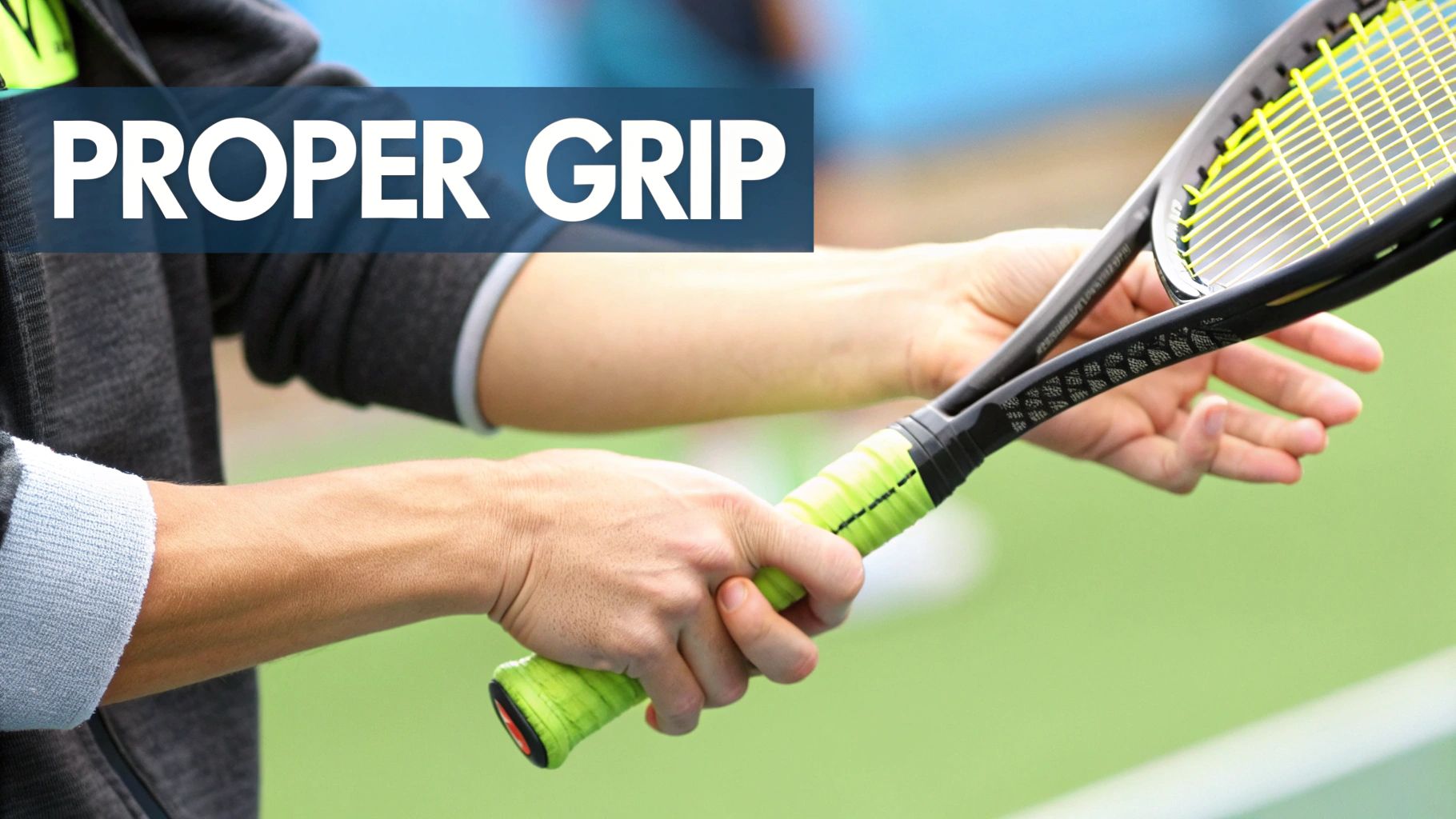
Choosing the right padel coach is a big deal. It's a personal decision that can literally make or break how quickly and how well you improve. This isn't just about finding someone who can smash a ball; it's about finding a guide who gets you—your goals, how you learn, and your vibe on the court.
Get it right, and your game will skyrocket. Get it wrong, and you're in for a lot of frustration and stalled progress. It takes a little bit of homework, but finding a pro who genuinely clicks with your ambitions is worth every second.
Start with Credentials and Experience
First thing's first: check their qualifications. A certified coach has been trained not just to play padel, but to teach it. That means they understand how to structure a lesson, keep you safe, and actually explain things in a way that makes sense. Look for certifications from well-known national or international padel federations.
Beyond the piece of paper, their real-world experience is what counts. You need to ask who they've worked with before. A coach who spends all their time with elite tournament players might not have the right approach (or patience) for a total beginner. Likewise, a coach who is fantastic with newcomers might not have the tactical depth to help an advanced player fine-tune their competitive edge.
Define Their Coaching Philosophy
Every coach has their own style, their own philosophy. Finding a good personality fit here is crucial. Some coaches live and breathe technique, running meticulous drills to perfect your bandeja or vibora. Others are all about tactics, focusing on game-like situations, court positioning, and smart decision-making.
Think about what you need most right now. Are your shots all over the place, or are you losing matches because you're making bad choices under pressure? Knowing your biggest weakness helps you find a coach whose style can fix it.
There's no single "best" method—only the one that's best for you. Ask them straight up how they run a typical lesson. Is it all about feeding you balls from a basket, or do they jump into point play? Their answer will tell you everything you need to know about whether their style matches how you learn.
Where to Look for Padel Coaching
Once you know what you're looking for, it's time to start the hunt. The padel community is usually pretty close-knit, so a good old-fashioned recommendation goes a long way.
Here are the best places to start your search:
- Your Local Padel Club: This is the most obvious and often the best starting point. Most clubs have their own coaches on staff or at least a list of pros they trust. You can usually watch them coach other people, which is a great way to see their style in action.
- Ask Other Players: Chat with players at your club whose game you respect. Ask them who they train with. A personal recommendation from someone you trust is probably the most reliable sign of a great coach.
- Official Padel Directories: National and regional padel associations often have online directories of their certified coaches. It's a solid way to find qualified pros in your area.
- Online Platforms and Social Media: A lot of coaches use Instagram or other platforms to share tips and drills. This is a fantastic way to get a feel for their personality and teaching style before you even reach out.
The Right Questions to Ask a Potential Coach
Before you commit to anything, have a quick chat with any coach you're considering. This is your chance to make sure you're both on the same page. Think of it like a mini-interview—you're hiring them for a pretty important role, after all.
Try asking these questions:
- What's your experience with players at my level?
- Can you describe your coaching style? Are you more about technique or tactics?
- What does a typical lesson with you look like?
- How do you help players see their progress over time?
- What are your rates and availability for individual or group padel coaching?
Their answers will give you a ton of insight. You're not just looking for an expert; you're looking for someone who is clear, encouraging, and genuinely invested in helping you get better. That's the real win.
Alright, let's break down what actually happens when you step onto the court for your first coaching session. It can feel a little mysterious, maybe even intimidating. Are you just going to hit balls back and forth for an hour? Not at all.
A good lesson is a focused journey, not just random practice. It has a clear start, a purposeful middle, and a constructive finish. This structure is designed to make sure every minute you spend on court is building your game, sharpening your technique, and boosting your confidence.
The Initial Welcome and Warm-Up
Every solid session kicks off with a quick chat and a proper physical warm-up. This isn't just small talk; it's a crucial part of the process. Your coach will probably ask what you want to work on, or maybe what went wrong in your last match. This check-in lets them tweak the lesson on the fly to fit exactly what you need right now.
Then comes the warm-up, which is all about getting your body prepped for the specific, sharp movements of padel. You can expect a mix of:
- Dynamic Stretching: Think leg swings and torso twists. These get your muscles loose and ready for what's next.
- Mini-Padel: You'll start with short, controlled rallies inside the service boxes. It’s a great way to get your eye in and feel the ball on the racket.
- Footwork Drills: Some quick steps and agility exercises to fire up the fast-twitch muscles you need for padel’s constant changes of direction.
This first phase isn't just about preventing injury; it's about getting you mentally locked in for the main event.
The Heart of the Session: Drills and Application
This is where the magic happens. Based on your goals for the day, your coach will guide you through drills designed to isolate and fix a specific part of your game. A good lesson won't try to fix ten things at once. Instead, it’s about making real, noticeable progress in one or two key areas.
Let's say you’re having a tough time defending balls off the back glass. The coach might feed you a series of balls that force you to use that wall, giving you instant pointers on your positioning, your swing, and your shot choice.
The point of a drill isn't just mind-numbing repetition; it's "purposeful practice." Every ball has a mission, and the coach's feedback is the roadmap to hitting it better the next time. That targeted approach is what makes coaching so powerful.
Once you've grooved the skill in a controlled setting, the coach will shift to the application phase. They'll set up a game-like scenario where you have to use that new skill under a bit more pressure. This is how you build the bridge from the practice court to a real match—learning to pull off the shot when it actually matters.
This structured improvement is exactly why quality coaching is in such high demand. The global padel sports market, which includes coaching services, was valued at around $204 million in 2023 and is expected to explode to nearly $493 million by 2032. That boom is fueled by players who get the value of structured learning, a trend you can explore in this market research on the padel industry.
Cool-Down and Constructive Feedback
Just like you started with a warm-up, you'll end with a cool-down. This helps your body kickstart the recovery process and cuts down on muscle soreness for the next day. It’s usually just some light hitting and static stretching, where you hold stretches for 20-30 seconds.
This final part of the lesson is also when you get your key takeaways. Your coach will recap what you worked on, point out where you improved, and give you one or two simple things to think about before your next session. That feedback is gold—it gives you a clear, actionable plan.
You'll walk off the court not just feeling like you had a good workout, but with a much deeper understanding of your own game. You’ll know exactly what you did well and what your homework is, turning every lesson into a clear step forward on your padel journey.
The Path to Becoming a Certified Padel Coach
For many players, the love for padel doesn't stop when they walk off the court. If you find yourself constantly analyzing technique and strategy, maybe it's time to consider a new path. Making the jump from passionate player to trusted instructor is an incredibly rewarding journey, but it takes more than a killer smash or a flawless bandeja to get there. To become a professional in padel coaching, you need experience, strategic know-how, and most importantly, a formal certification.
Think of that certification as your stamp of quality. It's the proof that you haven't just mastered the game's techniques, but that you actually know how to teach them safely and effectively. Certifications from recognized national or international padel federations give you a proven framework, ensuring your students get real, tangible value from your lessons.
The Certification Curriculum
Getting certified is about so much more than learning how to empty a basket of balls. These are comprehensive programs designed to forge well-rounded coaches who can adapt to any player, no matter their age or skill level. They hand you all the tools you'll need to be an effective teacher.
A solid curriculum will take a deep dive into several key areas:
- Advanced Padel Techniques: You'll move way beyond the basics, getting into the nitty-gritty of biomechanics and tactical uses for shots like the vibora, chiquita, and those tricky defensive lobs off the back glass.
- Pedagogical Skills: This is the art of teaching itself. You learn how to properly structure a lesson, break down complex concepts into simple, actionable advice, and give feedback that actually motivates players to improve.
- Sports Psychology: This part is crucial. You'll gain real insight into building a player's confidence, helping them stay focused under pressure, and working with them to set ambitious but achievable goals.
- Player Safety Protocols: It’s your job to keep everyone safe. This covers proper warm-ups, injury prevention, and general on-court awareness to create a healthy learning environment.
This kind of robust training makes sure you're ready for whatever challenges coaching throws at you.
Becoming a coach is a shift in perspective. You stop thinking about how to win the next point for yourself and start thinking about how to help someone else win theirs. It’s about deconstructing the game and rebuilding it for your student.
Career Opportunities and Tiers
Certification isn't just a one-and-done deal; it's usually a tiered system. As you rack up more experience and complete higher-level training, you unlock bigger and better career opportunities. An entry-level certificate might set you up perfectly to teach beginners and intermediate players at your local club—a fantastic way to build a reputation and sharpen your skills.
From there, you can progress to coaching competitive tournament players, developing high-performance junior talent, or even mentoring the next generation of coaches. Each tier opens a new door, letting you shape your passion into a truly fulfilling career.
If you're serious about taking this step, it's worth exploring the specific requirements. For a closer look at what it takes, check out our guide on how to become a padel coach and start mapping out your journey.
Of course. Here is the rewritten section, crafted to sound like it's from an experienced human expert and matching the provided blog post style.
Common Questions About Padel Coaching
Thinking about getting a padel coach? It's a great step, but it’s totally normal to have a few questions before you dive in. Knowing the nuts and bolts—like how much it costs, how often you should go, and what kind of lessons to take—makes the whole process a lot less intimidating. Let's clear up some of the most common things players ask.
The first thing on everyone's mind is usually the price. Costs can swing quite a bit depending on who you hire, where you live, and whether you're looking for a private lesson or a group clinic. A one-on-one session will give you that hyper-focused attention, while group lessons are easier on the wallet and a great way to learn the basics with other players.
Another big question is, "How often do I need lessons?" Honestly, it all comes down to your personal goals and your budget.
- For fast results: Try to get a lesson in once a week. That consistency is gold for building muscle memory and seeing real, tangible progress. You won't have time to forget what you learned.
- For steady improvement: A lesson every couple of weeks works wonders, especially if you're getting out on the court to practice what the coach taught you in between sessions.
- For a quick tune-up: Even just one lesson a month can be enough to iron out bad habits or give you a new strategy to work on.
What Is Better Private or Group Coaching
This is the classic debate, and the right answer really depends on how you learn best and what part of your game needs work. Private coaching is your best bet for laser-focused feedback. If your bandeja feels off or you just can't get your lobs right, a private lesson is the quickest way to fix it. The coach’s attention is all yours.
On the other hand, group lessons are fantastic. You get to learn in a social setting that feels more like a real game. They usually cover broader topics, like how to attack the net as a pair or how to defend tough shots, and you get to test your skills against different players. A lot of players find a mix is the sweet spot: use private lessons to sharpen your technique and group sessions to apply it in a match situation.
The most effective approach is often a hybrid one. Use private lessons to sharpen your individual tools, then use group sessions or match play to learn how to use those tools effectively with a partner.
Finally, a lot of players worry if they are "good enough" for coaching. The answer is always a huge yes. Coaching isn't just for advanced tournament players; it’s for everyone. It doesn't matter if you've never picked up a racket or if you're already playing competitively. A good coach meets you right where you are and helps you get to where you want to be.
At Padel Rumors, we believe that expert guidance is the key to unlocking your full potential on the court. Whether you're just starting or aiming for the top, we provide the resources you need to succeed. Explore our in-depth guides, gear reviews, and pro news at https://www.padelrumors.com.



